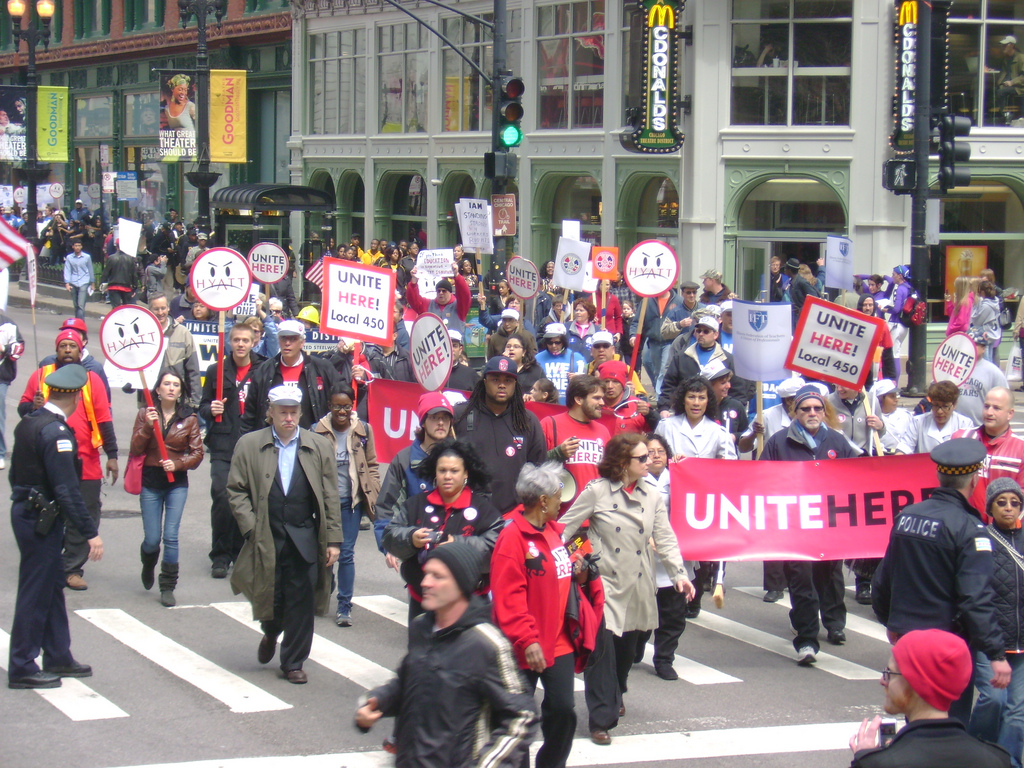
Will Ebeler is a student at Harvard Law School.
In this weekend’s news and commentary, PetSmart settles proposed class action that alleged it illegally collected workers’ voiceprints; Los Angeles hotel workers authorize a strike; and railroad unions reach deals on paid sick leave and more predictable schedules.
PetSmart has agreed to pay $424,000 to settle a proposed class action alleging it violated the Illinois Biometric Information Privacy Act. The BIPA requires that companies get written consent for collecting voiceprints, and the plaintiff alleged that the company required warehouse workers to use voice-recognition technology but didn’t get the required written consent. And it allegedly did not tell employees why it was collecting their data, how long it would keep the data, or what its policy was for destroying biometric information. The proposed class includes 472 workers who weren’t subject to an arbitration agreement and whose voiceprints were collected.
Last week, Linh discussed a strike authorization vote at Unite Here Local 11. On Friday, Los Angeles area hotel workers approved a strike with 96% of the vote. The union is pushing for a $10-per-hour wage increase and improved family healthcare. Workers have highlighted how furloughs and irregular work have made it harder to become eligible for healthcare through their employers. They’ve also argued that low pay and the LA region’s high housing costs have forced them to live far from their workplaces. One union member says she commutes two hours each way to work. The union is also hoping to get more job protection for its members after hotels used the COVID pandemic to cut staffing and increase workloads. Kurt Peterson, the co-president of Unite Here local 11, said the union gave its first proposal in April but has only recently heard back with any counter-proposal. That counter-proposal didn’t address any economic issues. As many as 15,000 hotel workers could go on strike on Fourth of July weekend if the parties can’t reach an agreement by then.
Finally, last year, when railroad unions planned to go on strike to push for paid sick days for their members, Congress and President Biden intervened to block the strike and impose a deal that provided no paid sick days. Six months later, according to the Wall Street Journal, 57% of all unionized railroad workers have paid sick leave agreements. And three companies have reached deals with unions that give crews more predictable rest schedules. One new schedule would ensure that railroad engineers work no more than four days in a row and get four consecutive days off in a 15-day period, while another has six work days followed by two rest days. These agreements have come after continued unrest among railroad employees; public pressure from union leaders and politicians to improve workers’ quality of life; and complaints about poor rail service. According to Jeremy Ferguson, the president of the Transportation Division of the International Association of Sheet Metal, Air, Rail and Transportation Workers, the toxic cultures at railroads had become more and more visible and it was clear it was time for a change. According to railroad executives, these deals have resulted in higher staffing levels and employee retention, and are ultimately improving service.






Daily News & Commentary
Start your day with our roundup of the latest labor developments. See all
July 14
More circuits weigh in on two-step certification; Uber challengers Seattle deactivation ordinance.
July 13
APWU and USPS ratify a new contract, ICE barred from racial profiling in Los Angeles, and the fight continues over the dismantling of NIOSH
July 11
Regional director orders election without Board quorum; 9th Circuit pauses injunction on Executive Order; Driverless car legislation in Massachusetts
July 10
Wisconsin Supreme Court holds UW Health nurses are not covered by Wisconsin’s Labor Peace Act; a district judge denies the request to stay an injunction pending appeal; the NFLPA appeals an arbitration decision.
July 9
the Supreme Court allows Trump to proceed with mass firings; Secretary of Agriculture suggests Medicaid recipients replace deported migrant farmworkers; DHS ends TPS for Nicaragua and Honduras
July 8
In today’s news and commentary, Apple wins at the Fifth Circuit against the NLRB, Florida enacts a noncompete-friendly law, and complications with the No Tax on Tips in the Big Beautiful Bill. Apple won an appeal overturning a National Labor Relations Board (NLRB) decision that the company violated labor law by coercively questioning an employee […]